VIDEO COURSES
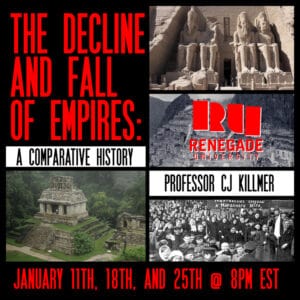
The Decline & Fall of Empires: A Comparative History
January 11th, 18th, and 25th @ 8pm EST
History is littered with fallen empires. The Roman, Mayan, Persian, Khmer, Russian, French, and English Empires, along with many more, have all risen and for one reason or another, fallen. What did they have in common? What were the causes? What was it like to experience an empire fall around you?
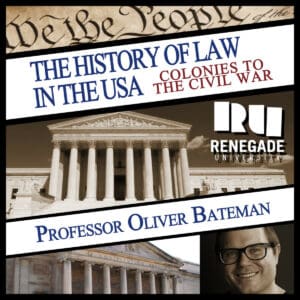
The History of Law in the USA – Colonies to the Civil War
October 27th, November 3rd, 10th, 17th, and December 1st, 8th @ 8pm ET
This History of the Law course with Dr. Oliver Bateman will trace the adaptation of laws to the changing social and economic needs of the early United States with an emphasis on the interrelations of law, public opinion, the legal profession, judiciary, and the political process. Topics include the Transatlantic origins of American law, slavery and indentured servitude, poor laws and dependency, family law, and developments in criminal and civil law.

Introduction to Cryptocurrency
This course explores and explains the crucial elements of cryptocurrency in history, technology, economics, and politics. The obscure and often confusing world of crypto is demystified and made immediately accessible, whether the student is an investor, an activist, or is simply hungry for knowledge on this fascinating and financially rewarding topic.
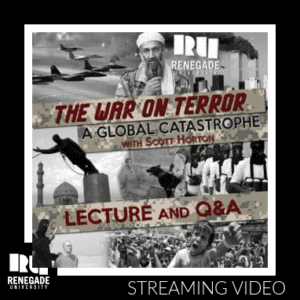
The War on Terror: A Global Catastrophe
In this course, Scott Horton, who has interviewed hundreds of the world’s leading experts on the War on Terror and is the author of the definitive history of the U.S. war in Afghanistan, will present an argument that U.S. military interventions created and sustained what appears to be a self-perpetuating war and that policymakers in the Bush, Obama, and Trump administrations bear principal responsibility for the greatest human catastrophe of our time.
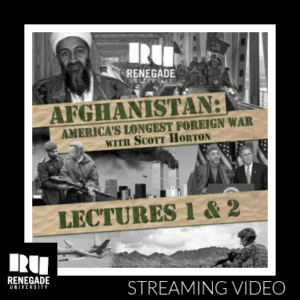
Afghanistan: America’s Longest Foreign War
A history of the origins and consequences of America’s longest war, with an argument made by Scott Horton, author of the most comprehensive analysis of the war, for immediate withdrawal.
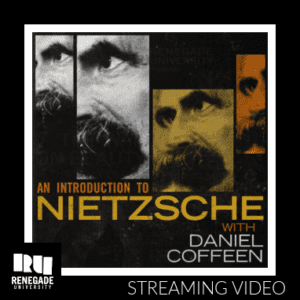
An Introduction to Nietzsche
Examining Nietzsche’s policy and politics of joy, radical life affirmation, and what it means to live outside of morality – with relentless ethics.

Make Your Own Guns: Glock 17
Sessions: Wednesdays, December 1 & 8 In this workshop, students will learn how to quickly get their printer going, complete with calibration and troubleshooting sessions in preparation to build printed guns. Students will need to procure the necessary materials and hardware, which for this class they will use to build a DD17.2 (Glock 17). This will provide plenty of background information for students to be comfortable building a gun and will lead into the next course where we will be building an FGC-9.
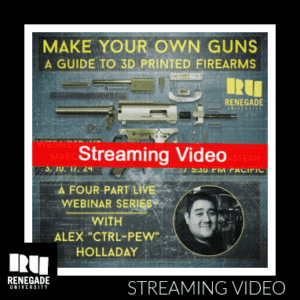
Make Your Own Guns: A Guide to 3D-Printed Firearms
This unprecedented course—a course that no regular university would consider offering—will guide you through the making of your own 3D-printed gun and give you the knowledge to become self-sufficient in providing for your own security.
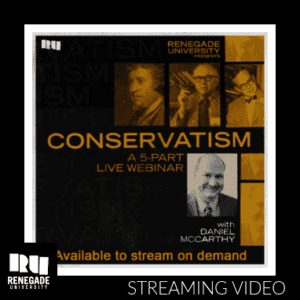
Conservatism
Instructor: Daniel McCarthy | Tuesdays, June 29 and July 6, 13, 20, and 27 | 8:30 PM Eastern / 5:30 PM Pacific
Conservatism is a much-contested idea, and in some quarters a much-reviled one. Is conservatism just another word for fascism, as many critics of Donald Trump and the latter-day Republican Party believe? Did conservatism betray its roots by turning illiberal? Or is conservatism a distinct tendency in political thought and action that is neither fascist nor liberal, but a powerful critique of both? In this course, Daniel McCarthy will lay out the case for conservatism as understood by its own best thinkers and through the themes characteristic of their thought.
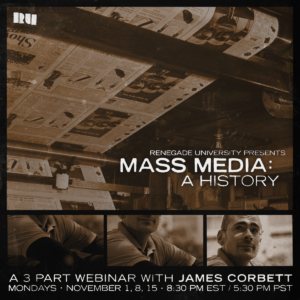
Mass Media: A History
Instructor: James Corbett
Mondays, November 1, 8, and 15, 2021
8:30 PM Eastern / 5:30 PM Pacific
Beginning in the late 19th century and accelerating in the 20th century, a series of technological innovations brought about the age of mass media: national newspapers, radio stations, TV networks, and now websites and social media. These new forms of media have transformed our relation to the world and altered the course of human civilization.
This three-part course explores those changes in their historical context, from the development of mass media technologies to the consolidation of the media oligopoly to the fracturing of narratives that has taken place with the rise of the Internet. Together, we will examine how the mass media and the industry that has grown up around it has been engineered to produce certain effects in the population and where these technologies are directing us in the 21st century.

The War on Beauty in the 21st Century
September 12, 19, and 26 @ 5:30 PM PST/8:30 PM EST
The year is 2021 and the entire world has been painted gray and sanitized for mass consumption. What went wrong in the 2010s, and how can it be corrected? In this course we will examine how one decade in American history sought to eradicate truth, beauty, and art, and replace them with a politics of fear, censorship, and self-policing minimalist austerity. We will learn how engagement with large, uncontainable narratives, reevaluation of forbidden and problematized works, and rediscovery of the neglected sense of smell can reverse the effects of a lost and dehumanizing decade.
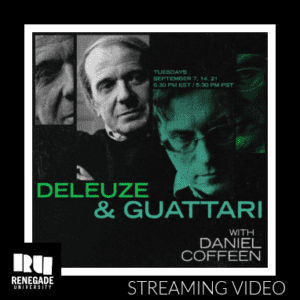
Deleuze and Guattari
Tuesdays, September 7th, 14th, 21st @ 5:30 PM Pacific / 8:30 PM Eastern — In this course, we’ll focus on passages from Deleuze’s “Difference & Repetition” as well as Deleuze & Guattari’s “A Thousand Plateaus” and “What is Philosophy?”. We’ll talk about how to read them (and why they write the way they write) and the worlds they create. And then we’ll dig into some of their beautiful concepts, figures, and operations such as difference in itself (haecceity), repetition, the rhizome, becoming-x, a Body without Organs (BwO), schizoanalysis, immanence, assemblages, lines of flight, territorialization (as well as re- and deterritorialization), and others.
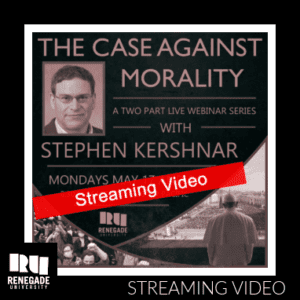
The Case Against Morality
Moral responsibility and morality lie at the heart of how we view the world. In our daily life, we feel responsibility-related emotions: gratitude, pride, love, forgiveness, resentment, indignation, and shame. We love those who freely and reciprocally love us. Also, we feel that people act rightly or wrongly, make the world better or worse, and are virtuous or vicious. These policies are central to our justifying how we see the world and treat others. This course will present and examine the argument that our views on these matters, except love, are false.
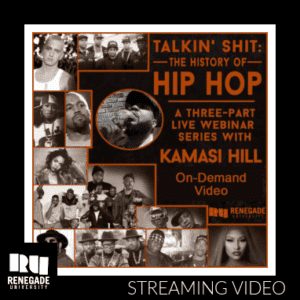
Talkin’ Shit: The History of Hip-Hop
This course examines the origins and rise of one of the most prolific yet misunderstood forms of popular culture in American history.
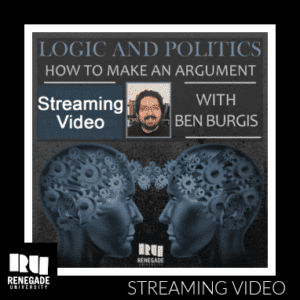
Logic and Politics: How to Make an Argument
Instructor: Ben Burgis | Tuesdays June 1, 8, 15, 22 | 8:30 PM Eastern / 5:30 PM Pacific
In this course you’ll learn how to break apart arguments and see if they work and, when they don’t, where and how they go wrong.
In a typical university informal logic or “critical reasoning” course, you might do this by studying unrealistic stock examples—arguments no one would ever make in real life. Instead, in this course, we’ll focus on examples from real arguments made in hotly contested political and philosophical debates on subjects ranging from capitalism vs. socialism to gender identity. In all cases, the point isn’t to tell you what to think, but to help you sharpen the analytic tools you can use to sift through these issues for yourself.
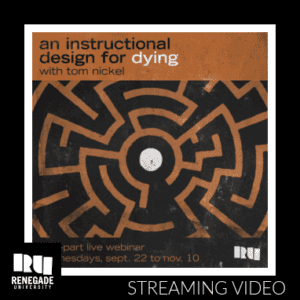
An Instructional Design for Dying
Sessions:
Wednesdays September 22 – November 10, 2021
8:30 PM Eastern / 5:30 PM Pacific
This 8-part live webinar will help you prepare for the end of life—psychologically, socially, and legally. The course includes content and optional activities for you to do at your own pace. It also features a parallel track offered in Virtual Reality for anyone with a VR headset. The course will provide reduced anxiety and peace of mind regarding end-of-life decisions. Attendees will benefit from optimized life priorities and strengthened relationships.
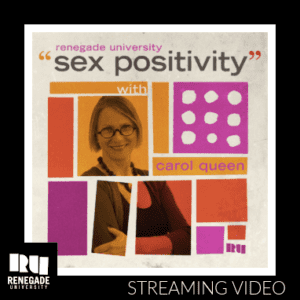
Sex Positivity
Sexologist Carol Queen tells the history of this culture-changing movement, whose roots lie in the emergent academic discipline of sexology in the 19th century, and argues for the value of establishing sex-positive cultures in a world full of diverse desires and boundaries.
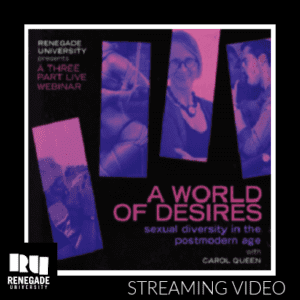
A World of Desires: Sexual Diversity in the Postmodern Age
Instructor: Carol Queen | Wednesdays, June 30, July 7 and July 14 | 8:30 PM Eastern / 5:30 PM Pacific
Taught by renowned sexologist Carol Queen, this course will examine sexualities that are outside the traditional heterosexual binary and transgress norms of acceptable sexual desires.. A failure to recognize and accept diverse identities has caused considerable cultural—and personal—pain and trouble. “A World of Desires” will teach a healthy sex-positivity beyond unnecessary binary norms. Insistence on a “normal” sexuality simply does not fit the conditions and constructions of the world as it exists today.
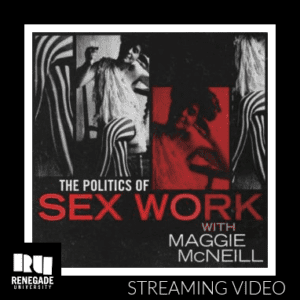
The Politics of Sex Work
The history, politics, and cultural norms of sex work, with an argument for why it should be decriminalized.
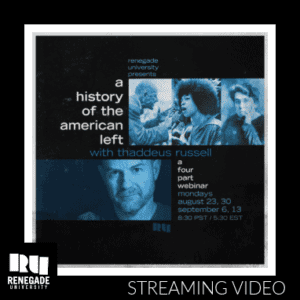
A History of the American Left
Mondays, August 23, 30 and September 6, 13 @ 8:30 PM Eastern / 5:30 PM Pacific — This course examines the history of the political and intellectual movement that is now at the heights of American culture, from radical abolitionism to progressivism to BLM. Though the great majority of Americans do not identify as radical or left-wing, what is called “the left” has taken commanding positions in many parts of American society.

